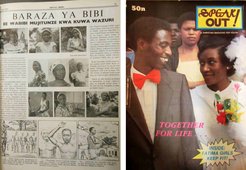Urban Intimacy in Eastern and Central Africa in the 20th Century
Stephanie Lämmert

My project investigates urban eastern and central Africa as a hub for African women on the move who were seeking autonomy. I focus on Northern Rhodesia/Zambia, the Belgian Congo/Katanga/the DR Congo, and Tanganyika/Tanzania in the period between the 1920s and 1990s. My sources consist of mission, government, and mining company publications and archives, as well as court records and oral interviews.
In the early 20th century, in the colonial copper towns of central Africa as well as in eastern Africa, rapid urbanization took place. As the mining industry grew on the central African Copperbelt and the eastern African coastal towns turned into colonial business and administrative centers, migrant laborers from the entire region flocked to the new towns. While the jobs on offer were hardly designed for women and their presence in town was discouraged by the colonial state, countless women came to the towns anyway, married and unmarried; the former group were following their husbands, while the latter included those who were not seeking the bond of marriage but looking for something else. Town life offered a number of new freedoms to women, such as being the head of one’s own household, business opportunities, wage labor (if limited), and formal education, but also new forms of leisure, pleasure, and romance. The Swahili saying kutafuta maisha, to search for the life, is an apt expression of what motivated African women to settle in towns.
How have these modern women, also referred to as femmes libres or champions, been depicted by male and female contemporaries since the 1920s? In what ways was the image of the modern woman intertwined with the discourse of (Christian) respectability and domesticity? What kinds of emotions are revealed through the (often male) gaze on urban women, and what were women supposed to feel, particularly those who resisted meeting the expectations set by respectability? How do the central questions of labour and the potential economic independence of women play out in the work that the emotions do?
